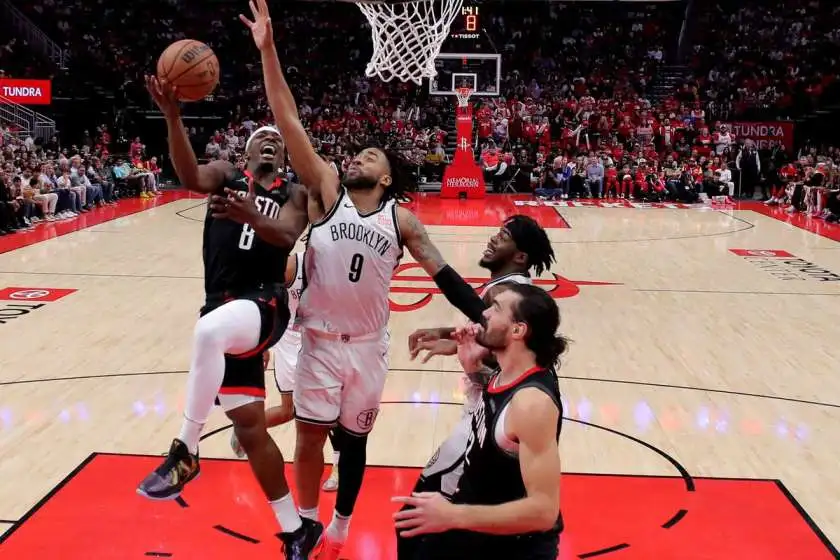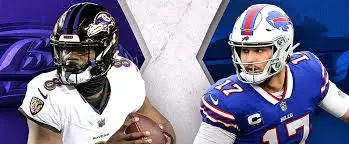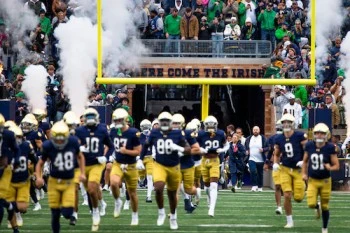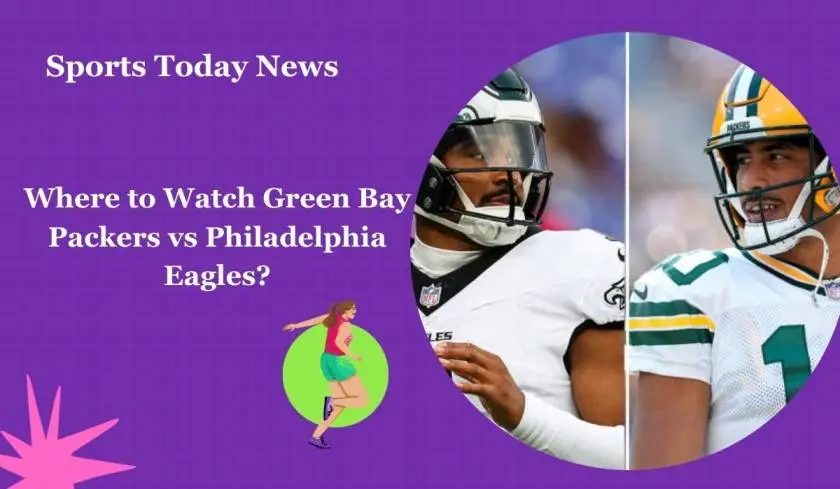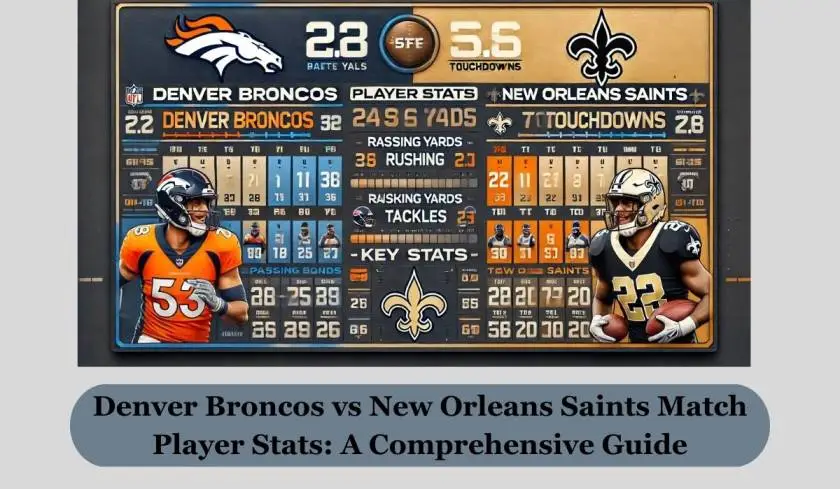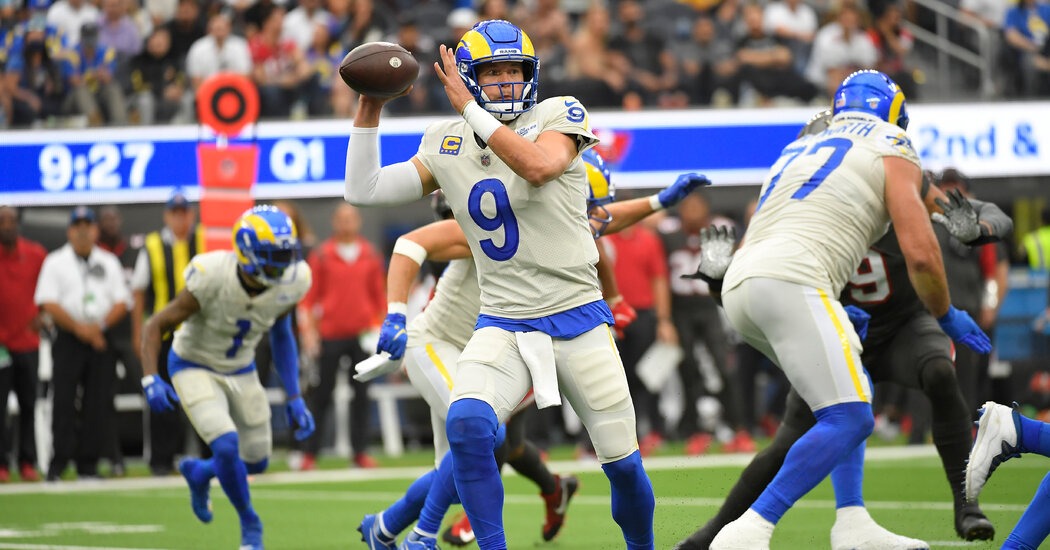
Matthew Stafford Wanted Big Games. Against Tom Brady's Bucs, He Got One.
After 12 seasons in Detroit with no postseason wins, the quarterback longed to play in big games. On Sunday he delivered, beating Tom Brady and the Buccaneers in Los Angeles.
INGLEWOOD, Calif. — Matthew Stafford said he wanted these moments.
After 12 seasons at quarterback in Detroit, where his biggest platform was the annual Thanksgiving afternoon game and his performances played second fiddle to TV viewers’ turkey dinners, Stafford, 33, asked to be traded. He wanted to play against quality competition in games that mattered.
Against the Tampa Bay Buccaneers, Stafford got that opportunity. Billed as a prospective preview of the N.F.C. championship game and contested in front of celebrities like Mike Tyson and Jason Sudeikis, Stafford faced the ferocious pass rush that fueled the Bucs’ Super Bowl win last season and Tom Brady, arguably the greatest quarterback of all time.
Stafford outshone them all. The Rams beat the Buccaneers, 34-24, thanks to his strong arm and smart decisions, along with a stout performance by Los Angeles’s defense. Granted, Stafford’s showing — 343 passing yards, four touchdowns and zero turnovers — came against a secondary handicapped by injuries.
But in front of more than 73,000 fans, Stafford showed he could make the throws necessary to make playing a Super Bowl at home in SoFi Stadium this season a reality. Afterward, he downplayed the significance of the win.
“Every time we go out there it is a big one,” Stafford said in a postgame news conference. “It was a big challenge for us but it was nice for us to go out there and play our game.”
His flatline response was a stark contrast to the ballast from both teams leading into a game players called a barometer to determine their standing in the league. Both were undefeated, viewed as among the best in the conference and the N.F.L. When they met last November, Brady and the former Rams quarterback Jared Goff attempted a combined 99 passes and racked up 592 yards in the air as the Rams barely won a shootout, 27-24.
Their 2020 seasons diverged. Tampa Bay won eight of its last nine games en route to the Super Bowl. The Rams, bitten by irresponsible play from Goff, wasted the effort of the league’s top-ranked defense toward the end of the season and exited in the divisional round of the playoffs.
But the Rams did not have Stafford last season, and his play offered glimpses of what Coach Sean McVay’s offense could achieve with a quarterback capable of placing the ball anywhere on the field.
Stafford completed a 75-yard touchdown pass to DeSean Jackson, the veteran receiver, in the third quarter, and connected on two touchdown passes to receiver Cooper Kupp and one to tight end Tyler Higbee. After the scoring throw to Jackson, whom Stafford had missed connecting with twice earlier in the game, McVay became so excited that he sprinted down the sideline to greet Jackson in a stadium tunnel.
But perhaps Stafford’s most important throw did not directly account for any points.
Midway into the third quarter, Brady orchestrated a 75-yard touchdown drive to cut Los Angeles’s lead to 21-14. Facing third-and-10 from the Rams’ 25-yard line, Stafford fired a pass to receiver Robert Woods for 20 yards, converting on a crucial play instead of giving the ball back to Brady with an opportunity to tie the score.
Three plays later, Stafford connected with Jackson for a 40-yard catch and run to set up Kupp’s second touchdown, a 10-yard catch.
The Rams often failed in long-yardage situations last season in part because they lacked an explosive deep threat at receiver and because Goff struggled when defenses did not need to respect the run or play-action. Now, with Stafford at the helm, McVay can unleash a variety of play calls he could not in 2020.
“As an offense, you always don’t want to be stagnate,” Kupp said of the unit’s design with Stafford. “Our job as an offense is to not be stuck doing the same thing over and over again but be able to have answers off it and make things look the same but be different.”
Still, the Buccaneers played competitively, considering how short-handed they were. Receiver Antonio Brown was not available after testing positive for the coronavirus this week. Pass rusher Jason Pierre-Paul also did not play because of hand and shoulder injuries.
The secondary lost cornerback Jamel Dean in the first quarter to a knee injury, a blow to a position group that had already been depleted with starter Sean Murphy-Bunting on injured reserve. McVay and Stafford exploited those absences early as receivers slipped past coverages and behind defenders with ease.
Brady, a California native who had never played an N.F.L. game in Los Angeles, finished with 432 yards and one touchdown pass. He also rushed for a score. The Rams’ defense hit Brady five times and sacked him three times, including a tackle by Aaron Donald that forced a fumble that the Buccaneers recovered. Though at times it gave up chunk plays, Los Angeles’s defense generally rallied to ball carriers for tackles and ultimately limited Tampa Bay to only 35 rushing yards. Brady led the team with 14.
“They played the kind of game they wanted to play,” Brady said. “If we’re going to be a team like that, we have to play well in all phases.”
Stafford and the Rams enter a critical stretch of the schedule, facing two N.F.C. West rivals, the Arizona Cardinals and Seattle Seahawks, in Weeks 4 and 5. Those matchups will matter for playoff seeding in the new 17-game regular season. After that, Stafford will be the one ensuring that he and the Rams have even bigger games in which to play.

